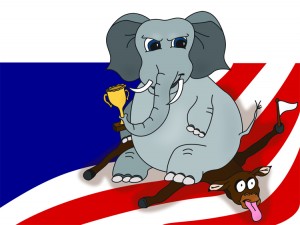
As the race for the 2014 midterm elections began, many college students were caught asking, “What election?”
According to Harvard University Institute of Politics survey, only about a quarter of voters between the ages of 18 and 29 said they planned to vote in Tuesday’s midterm elections. The actual turnout among Millennials exceeded this estimate but still remained at 31 percent, the lowest it has been in years.
“I think apathy exists because we feel the decisions of the government do not currently impact us,” Student Body President Jason Blumenthal said. “That is the wrong way of thinking because their decisions impact us the most. We don’t think long term that any money the government spends today has to be paid for by our generation.”
Many college-aged students were particularly disengaged in this year’s midterm elections. Some Millennials said they couldn’t figure out how to register, they simply didn’t care enough, or they just didn’t know the midterms were happening.
“I didn’t vote because people are more concerned with their party winning instead of voting for whoever they believe is better for our nation at the time,” junior mathematics secondary education major Hannah Gates said. “I think of myself as a moderate on the political scale.”
As Millennials continue to become the largest and most diverse generation in the nation, the lack of knowledge about gubernatorial elections may affect voter turnout and elections results.
“I feel it is [the] most important right as an American citizen to vote for any election but most definitely for gubernatorial elections as well,” Blumenthal said. “Gubernatorial elections are so important because governors propose the budget for each state, and they decided how money is spent within the state.”
This year’s midterm elections brought a shift in party leadership on the national scale, as Republicans earned the majority in the United States Senate and added to their lead in the House of Representatives.
Local incumbents retained their seats, Cheri Bustos (D) defeated Bobby Schilling (R) for a seat as the 17th District Representative, which encompasses Bradley’s campus. Additionally, 2002 Bradley graduate Aaron Schock (R) kept his seat as representative for the 18th District of Illinois.
Dick Durbin (D) defeated opponent Jim Oberweis (R) by a margin of nearly 10 percent to keep his seat and earn a fourth term as one of the state’s U.S. Senators.
Although these incumbents won their elections, former Gov. Pat Quinn (D) lost his position to businessman Bruce Rauner (R) by a nearly five percent margin, a result not predicted by pre-election polls.
As for the advisory questions that appeared on Tuesday’s ballot, Illinois voters supported both referendums concerning a requirement for insurance plans to cover contraceptives and a plan to increase statewide minimum wage to $10 per hour by 2015.
Because these ballot questions were advisory, the results do not make official law updates but instead serve to gauge public opinion for lawmakers in Springfield.
When newly elected officials take their seats in January, people across the nation may expect to see the government take a new direction under a Republican majority.
Rauner told the Chicago Tribune Nov. 5 that he was ready to lead Illinois into a brighter future.
“I look forward to getting to work to make Illinois the most compassionate and competitive state in the nation,” he said.
Rauner will be sworn into office Jan. 19, 2015.


One Response
It was hearting to hear from a young voice a considered opinion regarding the impact of current Federal Policy to future tax payers. It sounds like eyes might be opening as to who the real extremists are. If the argument in today’s politics was just over the size of the safety net for folks that aren’t able to provide for themselves, I would definitely share a lot of sentimate with the Left. But that isn’t what the new left is about, they want to take over more of the private sector and involve themselves with every decision that we as individual citizens make over are lives. One must also realize that the democrats are not alone in the rush to increase the federal goverments say over are lives. The Republican establishment (Chamber of Commerce, McConnell, Boehner…) are also big government advocates with a albeit a slightly different vision than the left (Obama, Reid, Warren,
Clinton…) . But there differences do not lead to any different treatment to the new conservative movement (a subset of which is the Tea Party, their energy go the thing going in 2010). Notice that almost all the young republican stars (Ernst, Love, Walker, Cruz, Paul, Gardner….) are from the conservative side of the republican party. The new conservative movement is not a movement of the “ridiculously wealthy 1%ers” , most of them donate to chamber of commerce and let them decide which republicans to support. These new conservatives are not about money, they are about freedom and keeping those freedoms that have always defined this country and that are now under assault by the left (Freedom to manage ones own health care, Freedom to keep ones hard earned money, Freedom to protest ourselves by arms, Freedom to decide how are children are educated and by whom…..). The establishment GOP has to acknowledge this movement and to begin to embrace it. Because they are the ones dying off, not us conservatives.